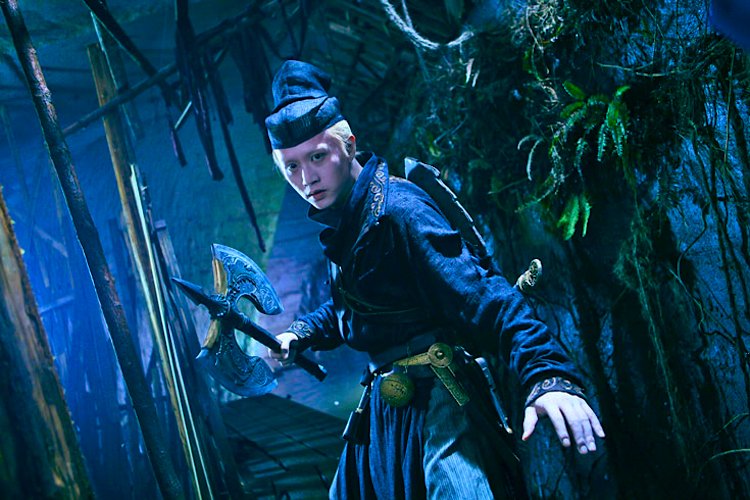By Joe Bendel. He was a legendarily honest and perceptive administrator during the turbulent reign of Wu Zeitan, the first and only woman to rule China in her own right. However, most westerners know him as Judge Dee, the protagonist of Dutch Asian scholar Robert van Gulik’s detective novels. Dee, or more properly Di Renjie’s powers of deduction, are such Wu Zeitan plucks him from prison to ferret out the truth behind a series of grisly deaths threatening to derail her coronation in Tsui Lark’s Detective Dee and the Mystery of the Phantom Flame, which screens during the 2011 Tribeca Film Festival.
One look at the giant Buddha statue under construction outside the Imperial palace (complete with internal staircase and observation deck) should tell viewers something spectacularly disastrous is in the offing. Currently, a former associate of Die Renjie is scrambling to finish construction in time for Wu’s official ascension. Suspiciously, the court architect and lead investigator spontaneously combusted there (presumably after seeing something sinister), setting work slightly behind schedule.
Through his animal avatar, the mysterious Imperial Chaplain tells Wu Zeitan who she’s gonna call: Die Renjie. Dispatched to fetch the imprisoned Die Renjie, the trusted Jing’er finds him fending off a horde of assassins with the help of his blind prison mentor. There will be plenty more for her blade over the course of their investigation, as well as a considerable helping of sexual tension with the tentatively rehabilitated Die Renjie.

Flame combines intricately choreographed martial arts sequences directed by Master Sammo Hung with big sprawling set pieces, like that giant Buddha statue and an underground city of thieves. While it straddles the mystery and fantasy genres, much of the supernatural skullduggery ultimately have Scooby Doo-like explanations (dubious though they might be). Frankly, style, setting, and action are what really count here, as Lark pulls viewers into this eerie world of intrigue and old school revenge.
Andy Lau projects an appropriately Zen-ish sensibility as Die Renjie. However, Li Bingbing really emerges as an action star, exhibiting dramatic nuance and gritty martial arts cred as Jing’er. Likewise, Deng Chao nearly matches her step for step as Pei Donglei, an albino Imperial copper. A character as intriguing as he looks, he starts out as a jerkweed, but earns his spurs as they probe the shadowy conspiracy afoot.
In terms of artistry and ambition, Flame falls somewhere between the Ip Man franchise (which are great fun, but essentially recycle the Rocky template) and crossover masterworks like Ang Lee’s Crouching Tiger, Hidden Dragon. With respect to ideology though, it is more closely akin to films like Zhang Yimou’s Hero, which argue in favor of a strong centralized authority, despite their occasional despotic excesses, as necessary means of unifying the country. Chinese state censors seem to like these storylines. Go figure. Regardless, Flame is a lushly rendered high-end period action film that should have appeal beyond fanboy circles (in which I should probably include myself for films of this genre). Definitely recommended, it screens again at Tribeca this Thursday (4/28).
Posted on April 27th, 2011 at 10:48am.